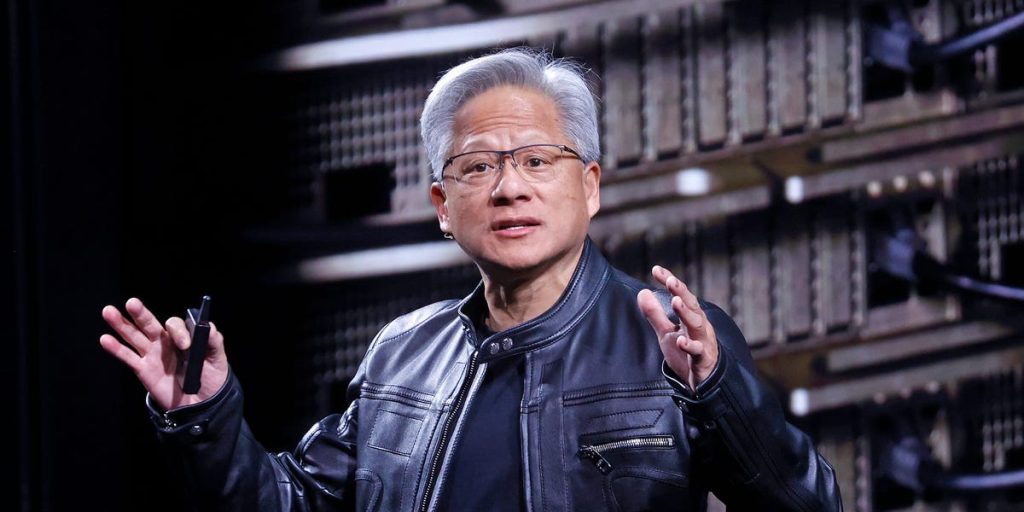The Chinese military wants to use Nvidia AI chips in a wide range of projects, from servers running Chinese startup DeepSeek’s most powerful model to a 33-pound “robot dog” with a high-definition camera, according to documents reviewed by Business Insider.
BI reviewed records on the Chinese People’s Liberation Army (PLA)’s official procurement portal, where military units post thousands of requests for equipment that local contractors can bid on.
Multiple requests over the past year reference both banned and permitted Nvidia hardware, including the H20 chip, on which the US is set to loosen export controls—a move that has sent Nvidia’s stock soaring.
An Nvidia spokesperson told BI that China has “more than enough” domestic chips for all its military applications.
“Buying a handful of older products to test the US competition is not a national security concern,” the spokesperson said. “Using restricted products for military applications would be a nonstarter, without support, software, or maintenance.”
While the Chinese military tries to buy Nvidia’s hardware, the chipmaker faces pressure from other parts of the Chinese government, which has long supported efforts to build a domestic alternative.
On Thursday, China’s internet regulator said it had summoned the company to explain alleged backdoor security risks in its H20 chips, claims that Nvidia has denied, Reuters reported.
How the Chinese army wants to use Nvidia chips
The military projects reviewed by BI are typically for servers to run AI models, like those built by DeepSeek, for unspecified purposes.
Please help BI improve our Business, Tech, and Innovation coverage by sharing a bit about your role — it will help us tailor content that matters most to people like you.
What is your job title?
(1 of 2)
What products or services can you approve for purchase in your role?
(2 of 2)
Continue
this data to improve your site experience and for targeted advertising.
By continuing you agree that you accept the
Terms of Service
and
Privacy Policy
.
Thanks for sharing insights about your role.
Three requests published this April call for banned Nvidia chips to power such servers. One requests at least eight H20 cards for a system capable of running one of DeepSeek’s largest and most powerful models, DeepSeek-R1 671B, at full capacity.
Another, tied to an “intelligent decision-making” support system that can also run DeepSeek, calls for four RTX 6000 graphics cards—also banned. Although the contract hasn’t been finalized, a supplier was provisionally selected in June. DeepSeek didn’t respond to requests for comment.
Another server request from the same month asks for an H100 graphics card—banned from export to China since 2022—which can cost tens of thousands of dollars apiece. The listing specifies that the cards must be delivered in their original packaging and installed on-site. Another AI server request published in July 2024 also calls for H100 GPUs.
The Chinese military isn’t only calling for AI servers.
One project from April, for example, shows a military unit requesting a 33-pound “robot dog” with an Nvidia Jetson computing module as part of an unspecified training project. This particular request was later canceled, and Jetson modules are not barred from being exported to China for most use cases.
It’s unclear whether the Chinese military actually obtained these chips. Ryan Fedasiuk, a former State Department advisor on China tech policy, says the Chinese military has many ways to acquire them.
“There are ample cutouts, subsidiaries, and shell companies that the PLA can and does use to source chips illicitly from American companies, including Nvidia,” he told BI.
Nvidia plans to sell H20 chips to China again
Some national security policymakers and professionals have expressed concerns about making it easier for China to get some Nvidia chips.
Twenty of them sent a letter to the Commerce Department on Monday asking the US to reimpose the H20 ban, saying the chips would “support China’s military.”
“This reversal will certainly open the floodgates,” said Craig Singleton, a senior director at the Foundation for Defense of Democracies who co-signed the letter.
The Commerce Department told BI that the current administration has tightened controls compared to its predecessor.
“The Trump Administration will consider any H20 license applications carefully, accounting for both the benefits and the costs of potential exports from America and taking into account the views of experts across the US Government,” a Commerce spokesperson said.
‘Nobody can beat Nvidia’
Fedasiuk reviewed some of the records found by BI and said they show that the Chinese military, like Chinese AI companies, wants to use the best hardware possible, and domestic chips like Huawei’s don’t cut it.
“In terms of sheer processing power that a given chip is capable of bringing to bear, nobody can beat Nvidia. Huawei is not close,” Fedasiuk said.
Nvidia CEO Jensen Huang has downplayed such concerns, saying China’s military doesn’t want to rely on US technology.
“They simply can’t rely on it,” Huang said in July on CNN.
“It could, of course, be limited at any time.”
China’s Ministry of National Defense, which represents the PLA, didn’t respond to requests for comment.

